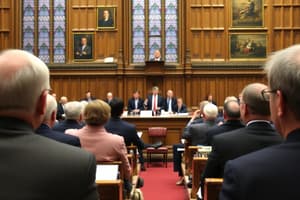Podcast
Questions and Answers
Welche Aufgabe hat ein Parlament?
Welche Aufgabe hat ein Parlament?
- Die Durchführung von Gesetzen.
- Die Kontrolle der Gerichte.
- Die Verwaltung der öffentlichen Finanzen.
- Die Vertretung des Volkes in der Gesetzgebung. (correct)
Welche der folgenden Aussagen über Parlamente ist richtig?
Welche der folgenden Aussagen über Parlamente ist richtig?
- Parlamente können die Regierung absetzen. (correct)
- Parlamente sind für die Auslegung von Gesetzen zuständig.
- Parlamente sind direkt vom Volk gewählt.
- Parlamente bestehen ausschließlich aus gewählten Abgeordneten.
Was ist die Hauptaufgabe der Legislative?
Was ist die Hauptaufgabe der Legislative?
- Die Kontrolle der Regierung.
- Die Auslegung von Gesetzen.
- Die Durchsetzung von Gesetzen.
- Die Erarbeitung und Verabschiedung von Gesetzen. (correct)
Welche Rolle spielen Parlamente bei der Kontrolle der Regierung?
Welche Rolle spielen Parlamente bei der Kontrolle der Regierung?
Welche Aussage über die Zusammensetzung von Parlamenten ist falsch?
Welche Aussage über die Zusammensetzung von Parlamenten ist falsch?
Flashcards
Was ist ein Parlament?
Was ist ein Parlament?
Parlamente sind Gruppen von gewählten Abgeordneten, die Gesetze erarbeiten und beschließen.
Wer wählt die Abgeordneten?
Wer wählt die Abgeordneten?
Die Abgeordneten im Parlament werden von den Bürger*innen gewählt.
Was machen die Abgeordneten in einem Parlament?
Was machen die Abgeordneten in einem Parlament?
Die Abgeordneten im Parlament diskutieren und beschließen neue Gesetze.
Was ist die Aufgabe des Parlaments gegenüber der Regierung?
Was ist die Aufgabe des Parlaments gegenüber der Regierung?
Signup and view all the flashcards
Warum sind Parlamente wichtig für eine Demokratie?
Warum sind Parlamente wichtig für eine Demokratie?
Signup and view all the flashcards
Study Notes
Definition of Parliament
- Parliaments are representative bodies where elected members of parliament (MPs) discuss and enact new laws (legislative function).
- This function involves debating, amending, and ultimately approving legislation.
- Parliaments hold the power to create new laws impacting the citizens and society.
Role of Parliament in Government
- Parliaments act as a check on the executive branch (the government).
- They monitor the government's actions and policies, ensuring accountability.
- This oversight function is crucial for democratic governance.
- Mechanisms for scrutiny often include questions, debates, and investigations.
- Parliaments can vote no confidence in the government, forcing a change in leadership or contributing to political instability, if the scrutiny uncovers significant issues or misconduct.
Legislative Function
- Parliaments are the primary bodies responsible for creating new laws.
- This legislative process typically includes several stages, including drafting, debate, amendment, and approval (e.g., by a majority vote).
- The specific procedures and requirements can vary significantly across different parliamentary systems.
- Laws passed by the parliament are essential for regulating and governing a society.
Parliamentary Oversight
- Parliaments utilize various methods to monitor the executive branch's actions.
- This includes scrutinizing government budgets and expenditures.
- The aim is to ensure transparency and proper resource allocation by the government.
- Parliaments also hold debates and question sessions with government ministers, allowing for public scrutiny of government policies and actions.
- Specific parliamentary committees are sometimes formed to investigate particular issues, contributing to the investigation and potentially uncovering potential wrongdoing by the government.
Studying That Suits You
Use AI to generate personalized quizzes and flashcards to suit your learning preferences.




